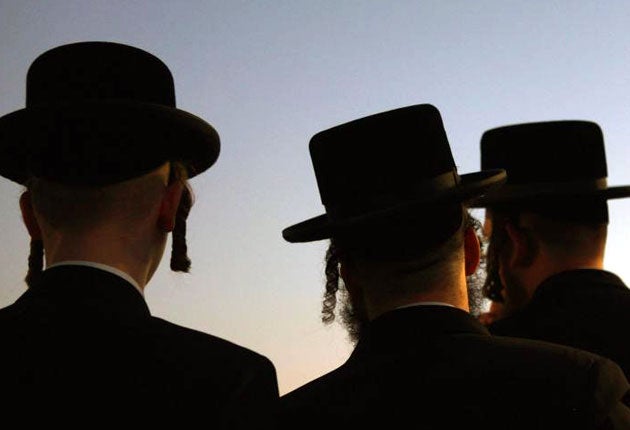Rabbis rage against net 'abominations'
Internet use exploding among ultra-orthodox despite dire warnings

Your support helps us to tell the story
From reproductive rights to climate change to Big Tech, The Independent is on the ground when the story is developing. Whether it's investigating the financials of Elon Musk's pro-Trump PAC or producing our latest documentary, 'The A Word', which shines a light on the American women fighting for reproductive rights, we know how important it is to parse out the facts from the messaging.
At such a critical moment in US history, we need reporters on the ground. Your donation allows us to keep sending journalists to speak to both sides of the story.
The Independent is trusted by Americans across the entire political spectrum. And unlike many other quality news outlets, we choose not to lock Americans out of our reporting and analysis with paywalls. We believe quality journalism should be available to everyone, paid for by those who can afford it.
Your support makes all the difference.Ultra-orthodox rabbis in Israel are trying to crack down on growing use of the internet among their followers, saying that it is filled with "abomination" and is leading believers astray.
But despite their efforts, the number of ultra-orthodox Israelis online is growing rapidly, while ultra-orthodox websites are proliferating.
In recent days, wall posters have sprung up in the ultra-orthodox Mea Shearim area of Jerusalem signed by the "Committee for the Purity of the Neighborhood". The posters voice alarm at growing use of the internet by rabbinical seminary students who live outside the school's supervision in rented flats. There have also been fire and brimstone-type broadsides against the internet during sermons by prominent rabbis in recent weeks.
"To our dismay, computers with all sorts of abominations have been found in the unsupervised flats, may God protect us," say the posters. The posters give a phone number to report seminary students who abuse computers.
Secular Israelis pride themselves on their country being at the cutting edge of internet technology. But the ultra-orthodox have always striven to be a community apart, preserving their ancient lifestyle and insular neighbourhoods guided by strict Jewish law as interpreted by their rabbis.
With Israel's establishment in 1948, the ultra-orthodox, fearing that the army would secularise their youngsters, were able to secure deferments for their youth from the mandatory service performed by other Israelis. The deferments turned into de facto exemptions.
But now the web is seen as a major new threat that could prompt youth to assimilate into larger Israeli society. "We consider it to be very dangerous," says Yitzhak Goldknopf, an ultra-orthodox rabbi and educator in Jerusalem who serves on a committee to ensure the Sabbath is observed. "It is something that is liable to cast down a lot of casualties."
The internet is seen foremost as violating modesty laws: the ultra-orthodox believe it is forbidden to publish even the faces of women. The web, according to rabbis, is also rife with "evil speech" and "idle gossip".
"This epidemic must be stopped," Yisrael Hager, a leading rabbi, said in a recent address to followers. One ultra-orthodox group, the Vishnitz Hasidic movement, has told its followers that if they install an internet connection, which it terms an "instrument of impurity" in their homes, their children will be excluded from the movement's educational system.
Some are profiting from the growing concern of the rabbis about internet use. In September, the Israeli firm Landau Computers began marketing computers whose Wi-Fi is hermetically sealed. The company invited its customers from the preceding year to bring back their computers and have them sealed free of charge.
Yet it appears that the warnings and injunctions of the rabbis are increasingly being ignored. According to Bezeq, the leading Israeli phone company, one- quarter of ultra-orthodox households have a Bezeq internet connection. "Internet use is growing all the time," says Dov Povarsky, editor-in-chief of the popular Bechadrei Charedim ("In the rooms of the ultra-orthodox") website. He says this is due in part to the advent of filters keeping out unwanted sites, "which enable people to allow themselves to surf."
The rabbis "are right that the internet is an instrument that can go in unwanted directions," says Povarsky, "but it is an instrument that cannot be ignored. I don't think they are really trying to stop it outright."
Join our commenting forum
Join thought-provoking conversations, follow other Independent readers and see their replies
Comments